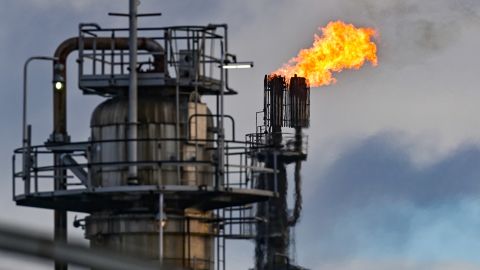London
CNN Business
—
Global crude oil prices surged to more than $110 per barrel and the cost of natural gas skyrocketed to a new record in Europe on Wednesday as Russia’s escalating military campaign in Ukraine stoked fear in markets about a supply shock.
Brent crude futures, the global benchmark, jumped nearly 9% to $113.65 per barrel, the highest level since 2014. US oil futures also gained more than 8% to trade at $112.25 per barrel. In Europe, the price of wholesale natural gas spiked 60% to a record high of €194 ($215) per megawatt hour. That’s more than double where it stood last Friday.
“The market panic is here,” said Louise Dickson, senior oil market analyst at Rystad Energy. “The initial upward price reaction after the conflict in Ukraine started six days ago is only intensifying.”
Russia’s energy riches haven’t been directly targeted by Western sanctions imposed following the invasion of Ukraine. But it’s a huge card the United States and Europe might yet play if Russia presses on with its assault.
“It’s still on the table, it’s not off the table,” White House press secretary Jen Psaki told CNN on Wednesday.
But she added that President Joe Biden does not want to “topple the global oil markets or the global marketplace, or impact the American people more with higher energy and gas prices.”
Moscow is already finding it harder to sell shipments of Russian crude oil to traders and refineries worried about being caught in the fallout from sanctions targeting the financial system. Tanker operators are wary of the risk to ships in the Black Sea, and major global oil companies are ditching operations in the country.
Russia’s flagship Urals oil grade was trading at an $18 per barrel discount to Brent crude on Wednesday as buyers shunned Russian exports, according to analysts at Commerzbank. The discount hasn’t been that wide since the collapse of the Soviet Union, the analysts said.
“Oil price differentials are reflecting a clear unwillingness to take Russian crude, and there continues to be [a] risk of more sanctions that could indirectly or directly impact oil purchases or supplies,” said S&P Global Commodity Insights’ Shin Kim, head of oil supply and production analysis.
The massive price hikes come despite efforts by the West to calm markets, and risk further fueling already elevated global inflation. On Tuesday, the United States and 30 other members of the International Energy Agency authorized the release of 60 million barrels of emergency oil reserves, which would cover roughly two weeks of Russian oil shipments.
“The bottom line is this is not enough to cool off the market. It’s a bit of a band-aid solution,” said Michael Tran, managing director of global energy strategy at RBC Capital Markets.


The huge prices increases will make fuel more expensive around the world, hiking the cost of travel and commuting. They will also add to inflation and could act as a drag on economic growth, complicating decisions by global central banks as they try to counteract rising prices.
Investors are afraid that Russian energy exports will be limited or halted as a result of the conflict in Ukraine — a key pipeline route, additional Western sanctions that could target the heart of Russia’s economy, or retaliation by Moscow.
“Russian oil is seeing buying interest evaporate,” said Commerzbank analysts. “The market appears to be increasingly pricing in an outage of Russian oil shipments,” they added.
Russian natural gas is continuing to flow to Europe, according to Alex Froley, a market analyst at Independent Commodity Intelligence Services. But there’s “a lot of uncertainty and concern about how things could change,” he said.
Froley noted that the United Kingdom has banned Russian owned and controlled ships from its ports, which could disrupt shipments of liquefied natural gas from Russia that account for between 3% and 4% of the country’s gas supply.
“Traders may be concerned whether continental Europe introduces a similar ban on Russian ships,” he said.
The Organization of the Petroleum Exporting Countries and allied producers including Russia agreed on Wednesday to stick with their plan of gradually adding oil to the market, defying pressure from developed economies to do more to ease prices.
The Saudi-led group, called OPEC+, said in a statement that it would increase output by 400,000 barrels per day in April — a small fraction of Russia’s 10 million barrels per day crude oil production.
“Current oil market fundamentals and the consensus on its outlook pointed to a well-balanced market, and that current volatility is not caused by changes in market fundamentals but by current geopolitical developments,” said OPEC+.
Nuclear negotiations between Iran and the United States could put more Iranian barrels on the market, but that wouldn’t ease the situation in the near term.
Many of the world’s biggest oil companies are quitting Russia or halting new investments in projects to explore and develop fields.
ExxonMobil said Tuesday that it was quitting its last project in the country, Sakhalin-1 — which was billed as “one of the largest single international direct investments in Russia.” An Exxon subsidiary was the project’s operator, and the company’s decision to walk away will end its presence of more than 25 years in Russia.
BP, Shell and Norway’s Equinor have all said this week they intend to exit their Russian businesses at a likely hit of billions of dollars to their balance sheets. France’s TotalEnergies has halted new investments.
— Mark Thompson and Julia Horowitz contributed reporting.
